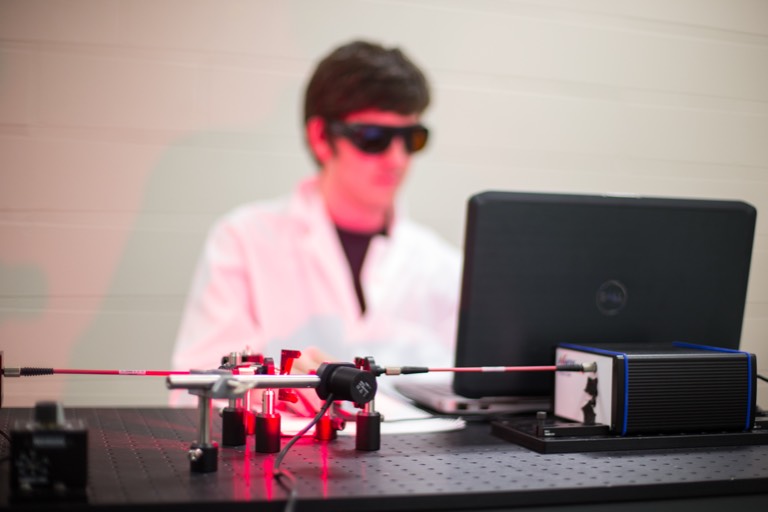Physics
Bachelor of Science
Program Description
Physics is the study of the physical universe; if you can touch it or imagine it, from the subatomic to the cosmological, it’s physics. The physics major is a customizable degree built around a core of courses that teach you different tools for solving complex problems (experimental, theoretical, and computational) along with a core of physics content courses (mechanics, electromagnetism, and quantum mechanics). The program also includes 18 credit hours of electives that can be chosen from an expansive list that includes many courses from other science and engineering disciplines. This gives you options. Graduate school in physics? Take more physics classes. Computational science? Take computer science classes. Biomaterials researcher? Take biology and chemistry classes. They all count toward your degree. Physics graduates go on to graduate and professional school in fields such as physics, astronomy, engineering, computer science, medical physics, medicine, law, and finance. Physics graduates can be found working in a variety of fields under titles such as physicist, engineer, analyst, and consultant.
The Physics major will create students who:
- Understand the fundamental areas of physics (mechanics, electromagnetism, and quantum mechanics).
- Can apply the techniques of experimental physics, data reduction, error analysis, and computing.
- Adapt readily to new and fluid situations.
- Can communicate technical ideas.
- Learn new things.
- Function independently in a variety of fields
- Are tenacious problem solvers.
After graduation, Physics graduates will use these skills to pursue advanced studies or to secure a professional position.
- Demonstrate physics-specific knowledge.
- Demonstrate problem-solving competency: Solve complex, ambiguous problems in real-world contexts.
- Demonstrate instrumentation competency: competency in basic experimental technologies, including vacuum, electronics, optics, sensors, and data acquisition equipment. This includes basic experimental instrumentation abilities, such as knowing equipment limitations; understanding and using manuals and specifications; building, assembling, integrating, operating, and troubleshooting equipment; establishing interfaces between apparatus and computers; and calibrating laboratory instrumentation and equipment.
- Demonstrate software competency: competency in learning and using industry-standard computational, design, analysis, and simulation software, and documenting the results obtained for a computation or design.
- Demonstrate coding competency: competency in writing and executing software programs using a current software language to explore, simulate, or model physical phenomena.
- Demonstrate data analytics competency: competency in analyzing data, including with statistical and uncertainty analysis; distinguishing between models; and presenting those results with appropriate tables and charts.
- Demonstrate effective communication skills.
- Demonstrate professional/workplace skills.
| Academic Year | Enrollment | Degrees Awarded |
| 2023-2024 | 26 | TBD |
| 2022-2023 | 18 | - |
| 2021-2022 | 20 | 5 |
| 2020-2021 | 25 | 5 |
| 2019-2020 | 35 | 7 |
| 2018-2019 | 51 | 6 |
| 2017-2018 | 58 | 11 |
| 2016-2017 | 63 | 9 |
| 2015-2016 | 68 | 8 |
Notes: Numbers above include students in both the Physics B.S. as well as the Physics B.S. Concentration in Astrophysics. The Engineering Physics, B.S.E. began fall 2017; students in the B.S.E. are not included in the numbers above.